Investigating the Dragon Prophecy in Game of Thrones


Intro
The intricate world of Game of Thrones is fueled by a rich tapestry of lore, political intrigue, and, most significantly, prophecy. Among these prophecies, none loom as large as the dragon prophecy. It serves as a framework for understanding critical character arcs and narrative developments. Its presence can be seen bubbling beneath the surface throughout the series, often leading viewers to question its implications.
This article aims to delve into the depths of the dragon prophecy, exploring its historical roots, its ripple effects on character motivations, and its significance to the lore of Westeros and beyond. With a careful eye on character dynamics, episode breakdowns, and fan theories, we’ll navigate the overlapping threads of this captivating prophecy.
Character Dissections
Detailed Analysis of Key Characters in Game of Thrones
The dragon prophecy has profoundly impacted several characters, notably Daenerys Targaryen, Jon Snow, and Viserys Targaryen.
- Daenerys Targaryen: Often referred to as the Mother of Dragons, Daenerys embodies the prophecy's essential themes of rebirth and destruction. Her journey from an exiled princess to a potential ruler encompasses elements of fire and blood, signaling her connection to the dragons and their fateful role in the prophecy.
- Jon Snow: The revelation of Jon's true heritage shapes his motivations and decisions throughout the series. As the son of Lyanna Stark and Rhaegar Targaryen, Jon is often seen as the embodiment of the prophecy of Aegon returning to save Westeros. His internal struggles and identity crisis add depth to the narrative.
- Viserys Targaryen: Serving as a contrasting figure, Viserys's obsession with the prophecy leads him to pursue power without the insight or nobility that Daenerys eventually exhibits. His downfall underscores the dangers of fixating solely on prophetic visions without understanding their broader implications.
Character Development Throughout the Series
The evolution of these characters illustrates the impact of the prophecy on personal growth and decisions. Daenerys, initially driven by vengeance and trauma, gradually fluctuates between wisdom and tyranny, reflecting the dual nature of destiny. Jon, a Stark in name and spirit, wrestles with the burden of expectations against his loyal upbringing.
Impact on the Overarching Storyline
The dragon prophecy triggers pivotal events, such as Daenerys’s rise to power and Jon’s alliance with her. Each character’s understanding of the prophecy influences the plots—they either embrace or reject their destinies. Their choices weave a complex narrative that challenges the traditional notions of heroism, duty, and fate.
Episode Breakdowns
Recap of Significant Events in Each Episode
Throughout the series, episodes like "The Dance of Dragons" and "The Lion and the Rose" underscore the dragon prophecy's importance. Significant moments, such as Daenerys commanding her dragons for the first time, tie closely to the prophecy’s conception of a Targaryen restoring peace.
Exploration of Themes and Symbolism
Fire and blood symbolize both creation and destruction, defining the essence of the dragon prophecy. The dragons themselves serve as metaphors for power—capable of both protection and devastation. They resonate with modern themes of control, liberty, and consequence, mirroring real-world struggles where power often comes at a cost.
Key Moments and Their Implications
- Daenerys's first flight with Drogon: Represents liberation and foreshadows her potential as a ruler. It reiterates the notion that she is intertwined with the fate of Westeros.
- The revelation of Jon’s parentage: This twist redefines relationships and alliances, highlighting how destinies intertwine in unexpected ways.
Lore Explorations
Delving into the Rich History and Lore of Westeros
The lore surrounding dragons and prophecies in Westeros creates a backdrop that enriches the narrative. Understanding the origin of Targaryen legends unveils connections between characters and their historical ancestors. The house’s tumultuous past with the dragons shapes everything from political decisions to personal identities.
Uncovering Hidden Details and Connections
Subtle references across seasons lend depth to the dragon prophecy. For instance, several characters, including Bran Stark, touch upon past events that reveal the cyclical nature of struggle in Westerosi history, reinforcing that the past resonates through the ages.
Exploring the Cultural and Mythical Aspects of the World
Dragons in Westeros serve multiple purposes: they are symbols of the Targaryen legacy, instruments of war, and embodiments of the prophecy itself. The cultural significance of dragons extends beyond power, impacting traditions, legends, and the characters’ very identities.
Fan Theories
Compilation of Popular and Intriguing Fan Theories
A myriad of theories surround the dragon prophecy. Some speculate that the dragons symbolize more than just physical beings; they suggest that Daenerys's control over them may dictate the fate of all living beings in Westeros. The possibility of Jon Snow’s alliance with the dragons has intrigued fans, leading to debates about the literal versus metaphorical meanings of prophecies.
Evaluation of Theories Based on Evidence from the Show
Several fan theories propose varying interpretations of prophetic elements, such as the role of Bran Stark in the overall narrative. His journey appears to align closely with themes of memory and foresight—tying into the dragon prophecy's implications for the future.
Speculation on Future Plot Developments
The unraveling prophecy could pave the way for unforeseeable conflicts and alliances in future storylines. Much speculation revolves around unresolved tensions within key characters that may echo the prophecy's impact well into the narrative's climax.
A great piece of advice from George R. R. Martin himself: "The best stories are those that resonate with reality, allowing truth to intertwine with fantasy."
Preamble to the Dragon Prophecy
In the expansive universe of Game of Thrones, the dragon prophecy stands as a pillar of intrigue and complexity. It’s akin to a riddle wrapped in a mystery, holding significant implications for character arcs and plot progression. The importance of the dragon prophecy cannot be understated; it interweaves with the myriad threads of history, destiny, and power plays suffused throughout Westeros.
The prophecy serves not only as a guidepost for character motivations but also as a lens through which the political dynamics of the Seven Kingdoms can be examined. For fans delving into the intricate lore, understanding this prophecy reveals deeper narratives and enriches the viewer's experience. It calls into question the nature of fate and choice—are characters acting on prophecy, or are they forging their own paths?
Defining the Dragon Prophecy
The dragon prophecy is often articulated in cryptic terms, referring to the rebirth of dragons and the rise of a ruler who would change the fate of Westeros. Within the lore, it predominantly features the Targaryens, a family marked by their unique connection to dragons. Their history is steeped in blood and fire, an allegory for the prophecies surrounding them.
Understanding the essence of this prophecy requires a look at who it involves and how these elements play out within the narrative. It does not merely indicate a return of dragons; it paints a broader picture of struggle, identity, and the continual quest for power.
The Origin of the Prophecy
The roots of the dragon prophecy are entrenched in the historical tapestry of Westeros, branching out from ancient legends to pivotal moments that defined the land.
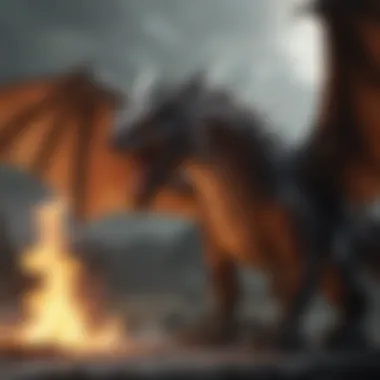
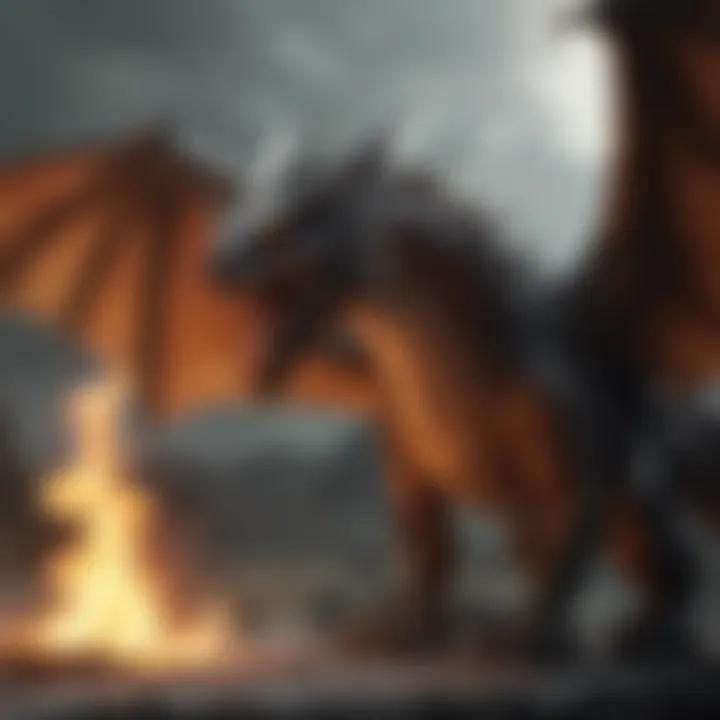
Historical context
The historical context shapes the framework of the dragon prophecy, hinting at events like Aegon the Conqueror’s rise to power and the Targaryen civil wars. These narratives are interwoven with dragons, emphasizing their role in warfare and dominion. By exploring this backdrop, we uncover the motivations of various houses and their interconnected fates.
The unique characteristic of this context lies in its multifaceted narrative, which contributes to our understanding of the prophecy's weight. For instance, the Targaryen's past successes and failures serve as a cautionary tale, illustrating the burden of expectation that accompanies such powerful legacies. This can be a beneficial lens, as it allows readers to see the interplay of history and prophecy.
Key figures involved
Central to the dragon prophecy are Targaryen figures, such as Daenerys Targaryen and her brother Aegon. Each character embodies different aspects of the prophecy and comes with their own motivations and conflicts. This dynamic is enriched by their lineage, signaling how prophecy can shape identity and choices.
The key aspect here is the contrasting qualities these characters present—Daenerys, often portrayed as a liberator, versus Aegon, whose claim is often seen through a lens of political intrigue. This duality creates a fertile ground for discussion and exploration of themes that are relevant beyond mere entertainment, pushing towards deeper philosophical implications.
The Role of Dragons in the Prophecy
The dragon prophecy looms large within the tapestry of Game of Thrones, creating ripples of influence across character arcs and the political landscape of Westeros. As symbols of ultimate power, dragons are not simply beastly weapons of war; they are manifestations of prophetic significance that shape destinies. Their role in the prophecy intertwines with themes of rebirth, legitimacy, and the heavy toll that comes with power. This section unpacks the nuances behind the dragons’ symbolic weight and how they affect both the narrative and the characters we’ve grown to love—or loathe.
Significance of Dragons in Westeros
Symbolism of power
Dragons carry a weight of symbolism that is hard to ignore in the world of Westeros. These mythical creatures embody raw power, ruling the skies and casting fear among foes. When we look at characters like Daenerys Targaryen, the dragons are intricately linked to her quest for the Iron Throne. Power, in the context of the dragons, is a double-edged sword. It grants the ability to conquer, yet it also burdens the wielder with immense responsibility.
This symbolism enriches the narrative significantly because, as we see, power doesn’t solely rest in brute strength but also in the choices the characters make. The sheer awe dragons inspire illustrates the eternal struggle between ambition and moral compunction, urging readers to ponder: what does it mean to wield such power?
Dragons as harbingers
In the realm of prophecies, dragons are often seen as harbingers of change. Their emergence signifies monumental shifts in the balance of power or the arrival of fateful events. Daenerys’s dragons herald a new era, reshaping the politics of Westeros and the fates of those she encounters. Their very presence is a signal—a loud and clear message that the status quo is about to be disrupted.
The unique feature of dragons as harbingers brings an air of inevitability to the narrative. Each time they take flight, it’s as if history itself shifts beneath the characters’ feet. This quality makes them a powerful asset when exploring themes of fate versus free will, compelling characters to react rather than act, often leading to unintended consequences.
Interpreting the Prophecy's Language
The language embedded in the dragon prophecy is riddled with complexities and ambiguities that demand careful examination. Understanding this language is critical to unraveling the prophecy itself and deciphering its implications for the characters involved.
Linguistic nuances
The linguistic nuances woven into the fabric of the prophecy serve to enrich the storytelling and create layers of meaning. Terms used in relation to dragons often have multiple interpretations, adding to the sense of mystique. Context matters hugely, as the same word can evoke fear or reverence based on who is interpreting it. For instance, when Daenerys refers to her dragons as "children," it speaks volumes, not just about her maternal instincts but also about the weight of responsibility she assumes.
This complexity is beneficial for capturing the imaginations of readers who relish diving into deeper interpretations. However, it does present challenges. Different interpretations can lead to fragmented understandings of the prophecy, with various factions interpreting the signs in self-serving ways.
Riddles and metaphors
Finally, the use of riddles and metaphors in the prophecy invites readers to uncover hidden meanings. When dragons are described in ways that hint at more mystical attributes, there’s a sense of layered storytelling at play. It’s not just about dragons as fire-breathing creatures; it’s about what they represent culturally and sociologically within Westeros. This element adds rich texture to the narrative.
Such metaphoric language engages readers, encouraging discussions and debates about interpretations. But it can also muddy the waters, creating divisions among fans who might not agree on what certain phrases signify. The riddles make the prophecy tantalizing yet opaque, a clever narrative device that keeps the audience wondering until the very end.
"Dragons are the heart of the prophecy, embodying the tangled mess of fate, power, and responsibility."
Overall, examining the role of dragons in the prophecy reveals their multifaceted nature. Not only do they serve as symbols of power, harbingers of change, and linguistic enigmas, but they also frame the core themes of Game of Thrones—how ambition can lead one astray, how destiny can be rewritten, and how the weight of legacy can haunt even the strongest leaders.
Characters and the Dragon Prophecy
The characters entwined with the dragon prophecy are the heartbeat of this narrative. Their individual journeys not only showcase personal ambitions and struggles but significantly reflect the overarching themes of power, destiny, and legacy in Westeros. Each character brings a unique perspective to the prophecy, revealing how it influences their choices and ultimately, the fate of the realm. The multilayered interactions between these characters provide a fertile ground for examining the immense pressure of expectations, the weight of lineage, and the impact of choice versus fate.
Daenerys Targaryen: The Chosen One?
Her journey and character arc
Daenerys Targaryen embodies the archetype of the classic hero, but with a twist. Starting as a pawn, at the mercy of her brother Viserys, she evolves into a formidable force, driven by her inherent desire to reclaim the Iron Throne. Her journey, from timid exile to the fiery Mother of Dragons, not only showcases her growth but also embodies the prophecy's themes of rebirth and transformation.
A striking characteristic of her arc is her unwavering ambition, which is tempered with vulnerability. This complexity makes her an appealing and relatable character for audiences. At times, her trajectory raises questions about morality and the cost of power. Her struggle illuminates how the prophecy drives her decisions, inviting debates about destiny versus free will. Yet, her insatiable quest for power has its disadvantages; it exposes her to the pitfalls of tyranny, leaving room for doubts among her followers and prompting discussions about her ultimate fate.
The weight of expectation
The burden of expectation rests heavily upon Daenerys. As the last surviving Targaryen, she grapples with the belief that she must fulfill her destiny—a notion that is fraught with personal and political implications. This weight is a double-edged sword: it propels her to aspire for greatness, yet it also isolates her as she maneuvers through the treacherous waters of Westeros' politics.
This aspect of her character is deeply compelling, as it resonates with the broader theme of legacy within the series. Daenerys faces the persistent challenge of meeting the ideals set forth by her ancestors while battling the realities of her rule. This conflict encapsulates the essence of expectation: it can breed resilience or lead to destructive choices. A unique feature of this expectation is the conflicting perceptions held by her supporters and adversaries, each interpreting her destiny differently. This dynamic adds layers to her narrative, making it ripe for analysis and discussion.
Aegon Targaryen's Claim
Revelations about lineage
Aegon Targaryen, or Jon Snow as he is initially known, introduces a fascinating twist in the tapestry of the Targaryen legacy. The revelation of his true parentage changes everything for the fabric of the prophecy and for the power dynamics in Westeros. His existence alone questions several tenets of traditional claims to the throne, emphasizing themes of fate and identity.
The significance of Aegon’s lineage is underscored by the profound implications it holds for the series. He is often viewed as a rightful heir, providing a stark contrast to Daenerys. This duality within their shared bloodline brings rich thematic explorations about legitimacy and rightful kingship. However, its uniqueness also poses challenges, as Aegon's claim raises doubts over Daenerys’s position, leading to inevitable conflict. The intertwining of their destinies captivates the audience's attention, as both characters must navigate the treacherous landscape of loyalty and betrayal.
The implications for legitimacy
The implications for legitimacy stemming from Aegon’s claim are monumental. His emergence as a legitimate heir places both him and Daenerys in precarious positions as they vie for the Iron Throne. This creates tension not just between them, but across various alliances throughout Westeros. Crucially, Aegon's claim casts doubt on the previously held narrative of Daenerys being the sole Targaryen successor, introducing a new layer of uncertainty into the prophecy.
Highlighting Aegon's legitimacy opens up discussions about what it truly means to rule. Is it just bloodline, or is it about the ability to inspire loyalty and wield power responsibly? In exploring this aspect, one can observe the contrasting paths of hope and tyranny. The unique feature of his claim lies in its capacity to challenge the narratives built around heroism and villainy, leading to rich debates within the fan community.
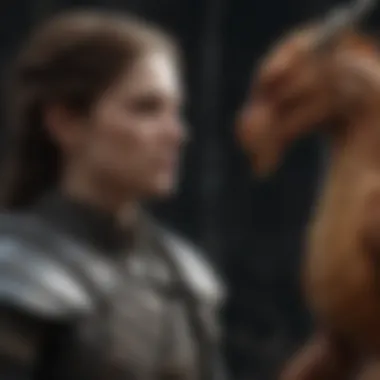
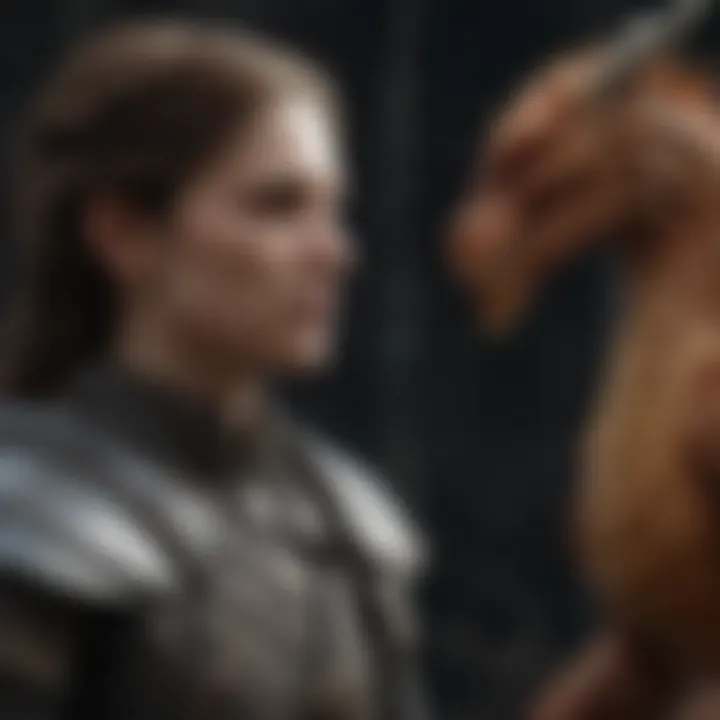
The Role of Prophecy in Jon Snow's Destiny
Heroism and sacrifice
Jon Snow's narrative embodies the essence of heroism intertwined with the theme of sacrifice. His evolution from the rejected Stark bastard to a key player in the struggle for survival against the Night King is emblematic of the sacrifices he makes along the way. Prophecy’s role here is critical—his willingness to place duty and honor above personal desires exemplifies the weight that legacy bears on character actions.
The heroic traits of Jon resonate significantly with audiences, showcasing how the concept of honor can lead to both great victories and immense losses. However, with this heroism comes significant sacrifices that shape his relationships, particularly with Daenerys. The unique feature of his journey lies in the tension created by the prophecy, which places Jon on an uncertain path, oscillating between his identity as a Stark and the emerging truth of his Targaryen heritage. This creates complex emotional layers that both enrich the narrative and challenge his notions of self.
Conflicting loyalties
Jon Snow navigates a web of conflicting loyalties that intricately ties back to the dragon prophecy. Torn between his Stark upbringing and Targaryen lineage, he faces the painful truth of where his true allegiance lies. This struggle becomes increasingly palpable as the stakes rise in the battle for Westeros. The conflicting loyalties add a profound complexity to his character, challenging the reader's expectations of loyalty within a fractured realm.
This aspect of Jon's journey highlights the fragility of alliances in a world defined by deceit and ambition. As a result, it prompts discussions about the morality of choices made in the name of loyalty. The unique feature of this conflict is its dual capacity to elicit sympathy and criticism, revealing the multidimensional nature of heroism in the series. This tension is essential for fully appreciating the intricacies of the dragon prophecy, as it intertwines with the fates of characters in unexpected and often tragic ways.
"The dragon's flame does not burn alone; it ignites hearts and shadows alike."
In summary, the characters linked to the dragon prophecy serve as the core of this exploration. Each character's journey contributes significantly to the nuanced understanding of prophecy, legacy, and the intricate dance between fate and free will in the eternal struggle for power within the realm of Westeros.
Themes and Motifs Related to the Prophecy
In the intricate tapestry of the Game of Thrones universe, the dragon prophecy serves not just as a narrative device but as a lens through which to understand larger themes and motifs. This allows fans to connect deeper with the story, providing a framework to explore how ambition, legacy, fate, and individual choices intertwine. Each of these themes resonates with characters and their experiences, inviting viewers to engage with the moral and ethical dilemmas presented in this epic saga.
Power and Responsibility
Consequences of ambition
The consequences of ambition are palpable throughout Game of Thrones. Characters like Daenerys and her brother Viserys Targaryen often find themselves on the tightrope between aspiration and hubris. Daenerys's journey, driven by the desire to reclaim her family's throne, showcases how ambition can be a double-edged sword. The advantages of her fierce determination made her a symbol of hope and strength, but it also brought destruction and instability to those around her.
Her ambition unveils a critical characteristic: it pushes characters toward their limits. Throughout the series, ambition leads to choices that dramatically reshape the political landscape of Westeros. The unique feature of this ambition, though, is its collateral damage. For example, Daenerys's decisions, while rooted in noble intentions, sometimes lead to catastrophic fallout, affecting both her allies and enemies alike, an illustration of how ambition can be both a driving force and a source of misery.
Legacy and its burdens
Navigating the notion of legacy and its burdens in the series reveals a landscape steeped in history and expectation. Those who bear the Targaryen name are tied to a legacy fraught with both honor and infamy. This heavy burden is not just about the past; it shapes the future for characters like Jon Snow and Daenerys. The weight of their ancestors’ deeds—good or bad—impacts their choices and, consequently, the fate of Westeros itself.
This theme highlights a central characteristic of legacies: they come with responsibilities and expectations that can be suffocating. For instance, Daenerys’s rightful claim to the Iron Throne is often overshadowed by her need to reconcile her family's brutal history. This duality adds an enriching layer to character development, illustrating how the past entwines with current dilemmas. The unique disadvantage of this burden is that it can cloud judgment, pushing characters toward paths driven by the need to meet expectations instead of authentic desires.
Fate versus Free Will
Choices defining destiny
The theme of choices defining destiny plays a vital role in the narrative. Characters in Game of Thrones often grapple with the consequences of their actions, highlighting a key characteristic that choices can lead to unforeseen and sometimes far-reaching effects. Take, for example, Jon Snow, whose decisions not only affect his fate but also ripple out, impacting friends and foes alike. The notion that one’s choices hold the power to script destiny captivates the audience and invites discussion on moral philosophy.
While destiny may seem preordained, the unique feature of this theme lies in its fluidity. Characters are not bound by a single path; they can make choices that reshape their trajectory, thus focusing the audience on the strength of individual agency. This aspect underscores a primary advantage: the power of choice becomes a redeeming quality in a world often steeped in dark fate.
Character agency
Finally, character agency stands at the intersection of fate and free will, illustrating how characters navigate their paths amid external pressures. This theme highlights that while external forces—like prophecies—attempt to mold their outcomes, the characters’ responses and decisions ultimately shape their destinies. A good example can be found in Tyrion Lannister, whose wit and intelligence empower him to carve his trajectory, despite the societal constraints tied to his family’s name.
Character agency emphasizes the important characteristic of self-determination amid chaos. Each decision a character makes, often in stark opposition to the prophecies or expectations laid out for them, holds weight. The unique challenge of this theme is that agency can lead to unpredictable, sometimes tragic outcomes, yet it remains central to the human experience in Westeros, showcasing the fragile balance between fate and choice.
"In a world where every decision can be fatal, it’s the choices made in the shadows that shape destinies."
This exploration of themes and motifs paves the way for a richer understanding of the dragon prophecy’s role in Game of Thrones, emphasizing how ambition, legacy, choices, and agency intertwine. These themes not only illuminate character motivations but also invite viewers to ponder the broader implications of their choices in the dispensation of power.
The Impact of the Dragon Prophecy on Westeros
The Dragon Prophecy is not just a passing murmur in the lore of Game of Thrones; it acts as a catalyst for profound transformation in the political and social landscape of Westeros. This prophecy embodies the very essence of ambition and ambition’s consequences, and its impact touches nearly every corner of the realm.
Political Intrigue and Power Shifts
When discussing the Dragon Prophecy, one cannot ignore the tangled web of political intrigue that characterizes Westeros. Alliances form and dissolve in the blink of an eye, as each character maneuver for position in what many perceive as an impending struggle for dominance.
Alliance and rivalry dynamics
One glaring aspect of alliance and rivalry dynamics is how they reflect the shifting loyalties among houses in Westeros. The Targaryens, with their dragons at hand, have always had an upper hand in negotiations and confrontations. This connection bestows them with leverage that other houses often lack. Hence, forming alliances becomes not just about friendship or common goals but also about survival in an unforgiving environment.
- Key characteristic: Trust is rare and often misplaced.
- Benefit: It propels the storyline forward, underpinning character motivations and unexpected betrayals.
- Disadvantage: This constant shifting creates confusion for both characters and viewers alike, as the loyalties can turn on a dime without warning.
The quest for the Iron Throne
The quest for the Iron Throne is arguably the most explored aspect in the saga of Game of Thrones. The Iron Throne is not merely a seat of power; it serves as the ultimate symbol of authority and influence across Westeros.
- Key characteristic: It depicts the idea of being rightful versus the actual rule.
- Benefit: This quest highlights the intense personal ambitions of characters like Daenerys Targaryen and Jon Snow, giving depth to their journeys.
- Unique features: The constant quest leads to some of the most shocking moments, where the will of characters and their actions drastically reshape the political terrain.
As various factions vie for control, the implications of the Dragon Prophecy seem to loom large, pushing some towards historical revivals while crushing others underfoot.
Prophecy's Influence on the Great Wars
The great wars in Westeros have been heavily influenced by interpretations of the Dragon Prophecy. It serves as a touchstone for characters and armies aiming to assert their supremacy, particularly those bold enough to incorporate dragons into their strategies.
Dragons in battle
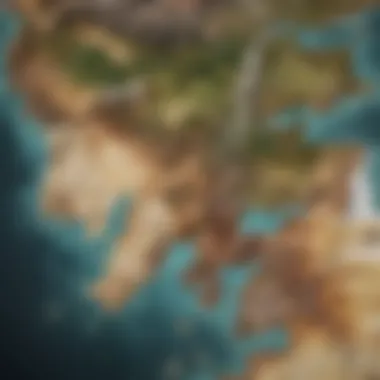
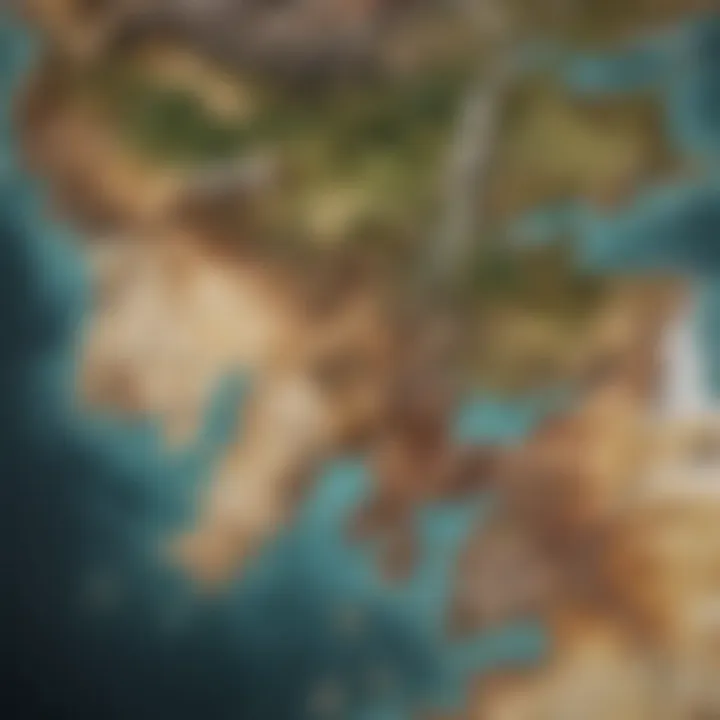
Dragons in battle are not merely a spectacle; they are a game-changer. The sight of these magnificent creatures soaring through the sky instills fear and intimidation in the hearts of enemy soldiers, altering their resolve.
- Key characteristic: They represent raw power that can turn the tide of war.
- Benefit: This introduces a unique strategic element that is rarely seen in traditional warfare.
- Disadvantage: However, dragons also make their own riders vulnerable, as the reliance on them could backfire if they are defeated or betrayed.
Strategic advantages
The strategic advantages afforded by the dragon prophecy manifest distinctly in the planning and execution of battles. Those who can harness the might of dragons not only gain aerial superiority but also a psychological edge over their enemies.
- Key characteristic: The unpredictable nature of warfare is compounded by the unpredictable element of dragons.
- Benefit: This makes battles dynamic and constantly engaging, reflecting the ever-changing fate of characters involved.
- Unique feature: However, over-reliance on such power can lead to disastrous consequences, instilling doubts about the long-term viability of such a strategy.
In summary, the Dragon Prophecy’s impact on Westeros is a rich tapestry woven with threads of political intrigue, alliances, warfare, and unpredictability. It acts not merely as a prophecy but as a living, breathing presence that continuously shapes the fates of its characters and the future of the realm, inviting viewers to ponder whether power can ultimately bring salvation or destruction.
Contradictions and Ambiguities
Understanding the Contradictions and Ambiguities surrounding the dragon prophecy is essential to grasp its complexities within the universe of Game of Thrones. This section aims to highlight how these contradictions welcome a variety of interpretations and foster rich discussions among fans and characters alike. The blurry edges of prophecy can sometimes spark as much intrigue as the narratives they intertwine with, leading to a multifaceted exploration of its relevance and implications.
Conflicting Interpretations
Varied perspectives among characters
The varied perspectives among characters about the prophecy showcase differing motivations and beliefs. Take, for instance, Daenerys Targaryen and Jon Snow. Daenerys often interprets the prophecy through a lens of destiny, believing it confirms her right to rule, enhancing her ambition. On the other hand, Jon's view is shaped by themes of sacrifice and duty, which often leads to internal conflict. This stark contrast serves as a backdrop for the plot, emphasizing how individual character arcs intertwine with the larger narrative.
This diversity in thought not only enriches the storytelling but also underscores how each character wrestles with their perception of fate. The key characteristic of this conflicting perspective is that it allows audiences to engage deeply with the material, offering a subjective experience of what the prophecy could mean. It's a popular choice for this article because it reveals the human elements behind these epic tales.
However, a unique feature of this varied interpretation lies in its drawbacks. At times, it might leave the audience perplexed about the true significance of the prophecy, which can create obstacles in understanding its impact on the narrative.
Fan theories and debates
Another layer to the fan theories and debates surrounding the prophecy opens up avenues for speculation that fuel the community's passion. Fans have concocted countless theories which range from interpretations of who the "dragon" truly refers to, to imagining potential outcomes of the prophecy’s fulfillment. This intricate web of discussions not only serves to keep the fandom engaged but invites varied understandings of the text, further solidifying its lasting power in the cultural zeitgeist.
The key characteristic of fan theories is their ability to create a communal experience that gives fans a spot to voice opinions and form bonds over their shared interests. This aspect makes it a beneficial choice for the article, as it brings forth an engaging narrative that many fans can relate to.
The challenge here, however, is that such theories can sometimes spiral into contradictions of their own, leading to debates that may muddy the waters instead of clarifying them. It can be a double-edged sword: while these discussions enrich joy in fandom, they may also sow confusion among viewers who seek clearer answers.
Unresolved Mysteries
Future of the prophecy
The future of the prophecy continues to hang like a specter over the series. With unanswered questions lingering in the air, it is pivotal to examine how these unresolved elements shaped the narrative's trajectory. The prophecy’s ambiguities keep viewers hooked, curious about how past interpretations might evolve as the plot thickens.
A crucial aspect of the future of the prophecy is the ongoing debate among fans regarding potential outcomes. This element captivates audiences since every season and episode may introduce new clues that lead to speculation. The article benefits from discussing this topic, as it reflects the expectancy and thrill that characterizes the series.
However, the challenge here can relate to the unresolved nature of such predictions. In some cases, if the storyline diverges significantly from established theories, it can potentially lead to disappointment among those invested in their interpretations.
Open-ended implications
The open-ended implications tied to the prophecy are a rich source of discussion. With numerous possibilities left unexplored, the flexibility allows fans to project their hopes, fears, and interpretations onto the narrative. Each cliffhanger or twist throws new questions into the mix, urging viewers to step into the minds of characters and theorize about various outcomes.
This feature is vital as it keeps the dialogue alive, prompting fans to continuously revisit earlier episodes with fresh eyes. Open-ended implications can drive fan theories and drive community engagement, making it a fitting discussion point in this article.
Nevertheless, it may also create frustration for viewers seeking conclusive answers. As characters make choices influenced by the prophecy, the lack of closure around certain aspects can lead to dissatisfaction, questioning the purpose of the original foreshadowing.
Overall, contradictions and ambiguities within the dragon prophecy not only spark deep discussions among characters but also engage the audience, holding a mirror to the nature of interpretation itself. This exploration reinforces the enduring influence of mythos in Game of Thrones, encouraging both critics and casual viewers to continue examining its legacy.
Closure: The Legacy of the Dragon Prophecy
The Dragon Prophecy has left an indelible mark on the story of Game of Thrones, resonating through its characters, plots, and themes. This overarching narrative invites viewers to ponder deep questions about destiny, morality, and the cyclical nature of history. In reflecting on the legacy of this prophecy, one must consider that its threads weave through not just individual arcs, but also the fate of entire realms within Westeros. The complexities of the prophecy challenge characters to confront their beliefs and decisions, ultimately revealing much about the human condition itself.
Enduring Themes in Literature
Comparative analysis with other works
The Dragon Prophecy stands out as a compelling narrative device within Game of Thrones, echoing themes present in various literary traditions. Fiction often draws on prophetic motifs to unravel plots and build tension. The use of prophecy serves to enhance the drama, as seen in works like The Lord of the Rings or Macbeth. Each of these works captivates the audience by presenting characters who grapple with preordained outcomes, often resulting in tragic failings.
A significant characteristic of such narratives is how they reveal the human struggle against fate. This allows Game of Thrones to offer rich commentary on leadership, sacrifice, and ambition. The interplay of interpretation versus intended meaning within the Dragon Prophecy mirrors the complexities found in other significant works, thus providing a richer reading experience. One notable feature here is how literary prophecies can take on different meanings depending on the perspective of the reader or character, showcasing the advantages of ambiguity.
Mythological underpinnings
The Dragon Prophecy doesn't merely exist in isolation; its roots stretch deep into various mythological traditions. Key to its richness is the notion that dragons often symbolize power, creation, and destruction—elements that echo in numerous cultures. Just as mythologies across the globe depict celestial snakes and fire-breathing beasts, the dragons in Game of Thrones embody the duality of power.
This aspect provides clarity about the inherent dangers and responsibilities tied to wielding such power. The mythological associations enrich the viewer’s understanding, as one can draw parallels with many heroic tales that warn against hubris. Though advantageous in developing the prophecy's thematic depth, these mythological references can also be dense and complex, occasionally distancing casual viewers from fully grasping their significance.
Final Thoughts on Its Relevance
Long-lasting impact on fandom
The Dragon Prophecy has undeniably shaped the Game of Thrones fandom, inviting fervent discussions and analysis. Its complexity invites debate, prompting fans to speculate and develop theories about its implications for character fates and plot directions. This active engagement not only strengthens community bonds but also enhances investment in the series itself. The profound characteristic here is how the prophecy encourages deeper dives into the lore, enriching the overall viewing experience.
However, while it heightens fandom engagement, the ambiguity surrounding the prophecy can sometimes lead to tensions among viewers who hold differing interpretations.
Enriching the understanding of the series
Reflecting on the Dragon Prophecy illuminates not just its own intricate designs, but also serves to deepen appreciation for the series as a whole. Understanding its implications allows one to view character decisions and plot twists through a more insightful lens. This thematic richness resonates with audiences who crave layers of meaning.
The unique feature this brings is that it prompts viewers to consider how individual choices ripple through the broader historical and cultural landscape of Westeros. This holistic understanding contributes greatly to a more nuanced engagement with the series, allowing both casual observers and serious fans to rediscover depth in the narrative arcs.
The Dragon Prophecy encapsulates the fundamental human truth: even amid the clouds of uncertainty, we seek clarity, attempting to navigate our own paths through chaos.



